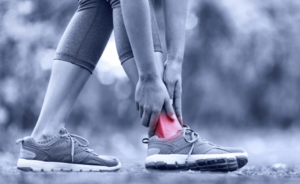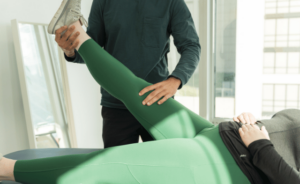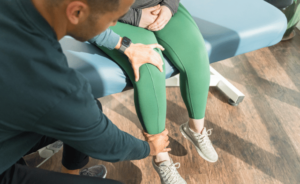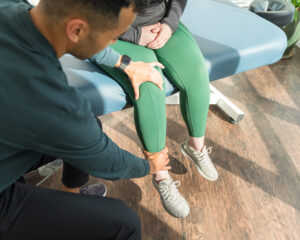Introduction
From hiking and biking to skiing and soccer, the city offers a plethora of opportunities to stay active. However, the pursuit of an active lifestyle can sometimes lead to sports-related injuries. For athletes in Vancouver, Intramuscular Stimulation (IMS) has emerged as a game-changer in sports injury rehabilitation. In this blog post, we will explore the pivotal role of IMS in helping athletes recover from injuries and share some inspiring success stories from the city.
For IMS treatments, we recommend the following:
Understanding IMS in Sports Injury Rehabilitation
Intramuscular Stimulation (IMS), often called “dry needling,” is a specialized technique used by physiotherapists to alleviate musculoskeletal pain and dysfunction. IMS targets specific muscle trigger points, which are tight bands of muscle fibers that can develop due to overuse, injury, or muscle imbalances. These trigger points are often the source of pain, reduced mobility, and impaired athletic performance.
IMS involves the insertion of fine, sterile needles into these trigger points, stimulating a reflexive response. This response causes the muscle to contract and relax, releasing tension and promoting pain relief. For athletes recovering from sports-related injuries, IMS offers several advantages:
- Precision: IMS allows physiotherapists to target the exact source of pain or dysfunction within the muscle, ensuring precise treatment.
- Immediate Relief: Many athletes experience immediate pain relief following IMS sessions, enabling them to resume their training and competition schedules more quickly.
- Improved Mobility: IMS helps release tight muscles and restore mobility, essential for athletes looking to regain their full range of motion.
- Accelerated Healing: By resolving underlying muscular issues, IMS promotes faster healing and reduces re-injury risk.
- Non-Invasive: IMS is a non-surgical, minimally invasive technique that avoids the need for medication or more invasive procedures.
Now, let’s delve into some success stories from Vancouver athletes who have benefited from IMS in their journey to recovery.
Success Story #1: Maggie’s Triumph Over Runner’s Knee
Maggie, an avid long-distance runner from Vancouver, was on the brink of despair when she developed severe knee pain, often referred to as “runner’s knee.” Her pain had escalated to the point where running had become impossible, and even simple tasks like climbing stairs were excruciating.
Maggie sought help from one of our physiotherapists who recommended IMS as part of her rehabilitation plan. After a few sessions, Maggie noticed a significant reduction in pain and an improvement in her knee’s mobility. With continued IMS treatment, along with a tailored exercise regimen, she not only conquered the runner’s knee but also achieved her personal best in a local marathon. Maggie”s story is a testament to the power of IMS in helping athletes overcome challenging injuries and regain their competitive edge.
Success Story #2: Max’s Return to the Soccer Field
Max, a dedicated soccer player, faced a severe hamstring injury that threatened to sideline him for an entire season. He underwent traditional physiotherapy but was still experiencing lingering discomfort and limited mobility.
His physiotherapist recommended IMS to target the persistent muscle tightness in his hamstring. After several IMS sessions, Max experienced a remarkable improvement in both pain relief and flexibility. With continued treatment and a gradual return to training, he was back on the soccer field, contributing to his team’s success. Max’s journey exemplifies how IMS can complement traditional physiotherapy to expedite an athlete’s return to their sport.
Success Story #3: Cindy’s Triumph Over Tennis Elbow
Cindy, an aspiring tennis player, developed a nagging condition known as tennis elbow. This condition significantly hindered her ability to play and practice effectively. Frustrated and concerned about her tennis career, she sought the expertise of a physiotherapist experienced in sports injuries.
IMS was incorporated into Cindy’s treatment plan, with a focus on targeting the specific muscles involved in her condition. Cindy noticed a marked reduction in pain after just a few IMS sessions. She continued her rehabilitation with a combination of exercises and IMS, eventually making a full recovery. Cindy’s dedication, combined with the precision of IMS, allowed her to return to competitive tennis, where she continues to excel.
Success Story #4: Michael’s Comeback from a Cycling Injury
Michael, an avid cyclist, endured a cycling accident that resulted in a severe hip injury. His recovery journey was challenging, with lingering pain and mobility issues affecting his passion for cycling.
After consulting with a physiotherapist experienced in sports injuries, Michael began IMS sessions to address the muscular tightness and discomfort in his hip. IMS, combined with a tailored rehabilitation program, played a pivotal role in his recovery. Over time, Michael not only regained his mobility but also participated in competitive cycling events, including some of Vancouver’s famous bike races. His story underscores the transformative impact of IMS in the rehabilitation of athletes.
The Key Takeaway: IMS and the Road to Athletic Recovery
IMS has become an invaluable tool in the arsenal of physiotherapists and sports medicine professionals in Vancouver. It offers athletes a targeted, effective, and non-invasive approach to address the muscular issues that often accompany sports-related injuries. The success stories of athletes like Maggie, Cindy, Max and Michael demonstrate that IMS can be a game-changer in sports injury rehabilitation, enabling individuals to not only recover but also excel in their chosen sports.
If you’re an athlete in Vancouver dealing with a sports-related injury or persistent musculoskeletal pain, IMS may be the solution you’ve been seeking. Consult with one of our qualified physiotherapists experienced in IMS to explore how this innovative technique can be integrated into your rehabilitation plan. With IMS, you can embark on a journey of recovery, returning to the sports and activities you love with renewed vigor and confidence. Your success story in Vancouver’s active sports scene could be just a few IMS sessions away.






